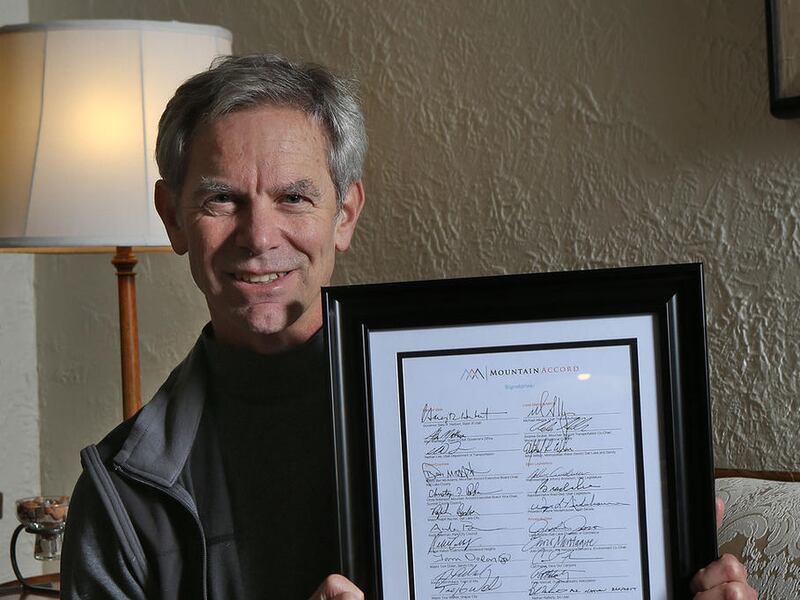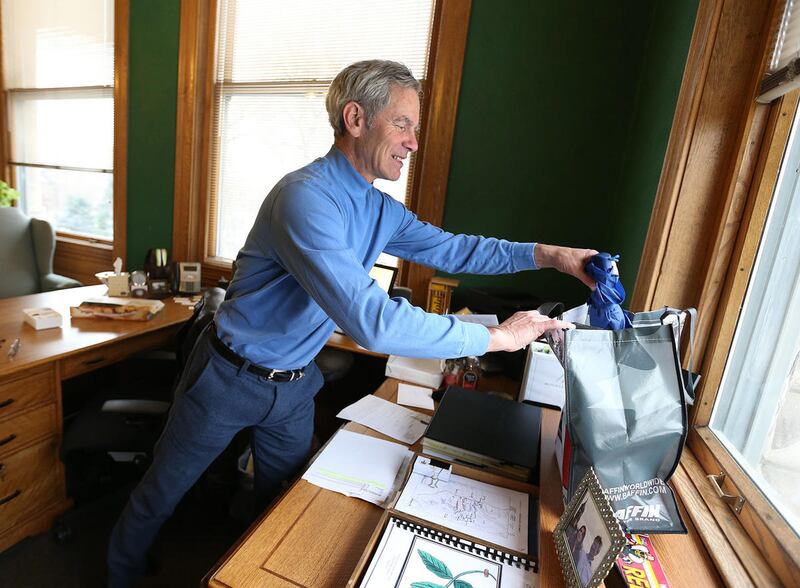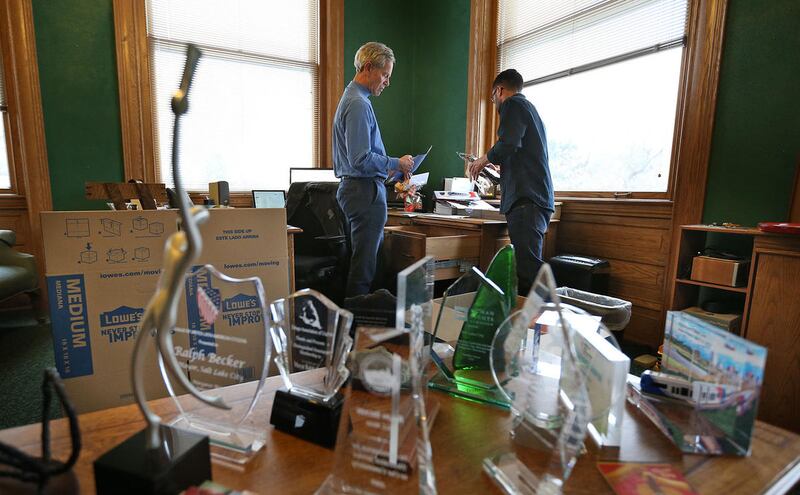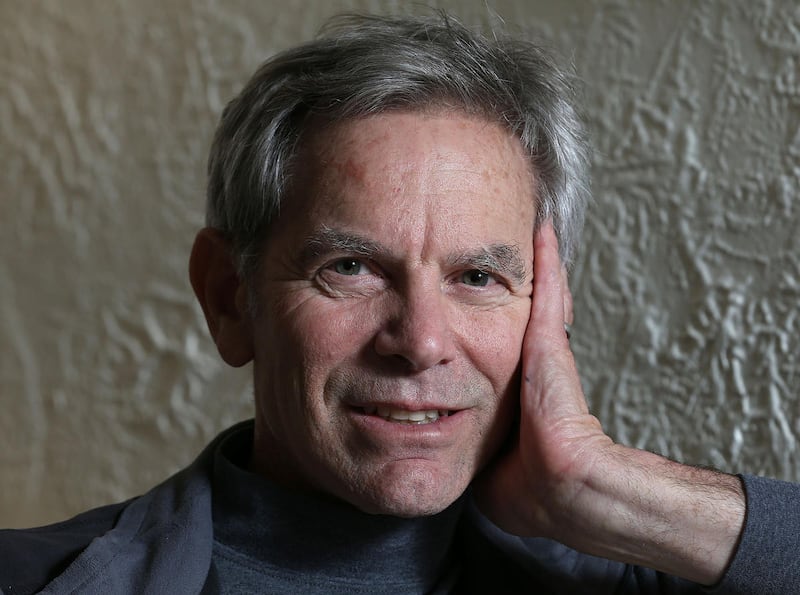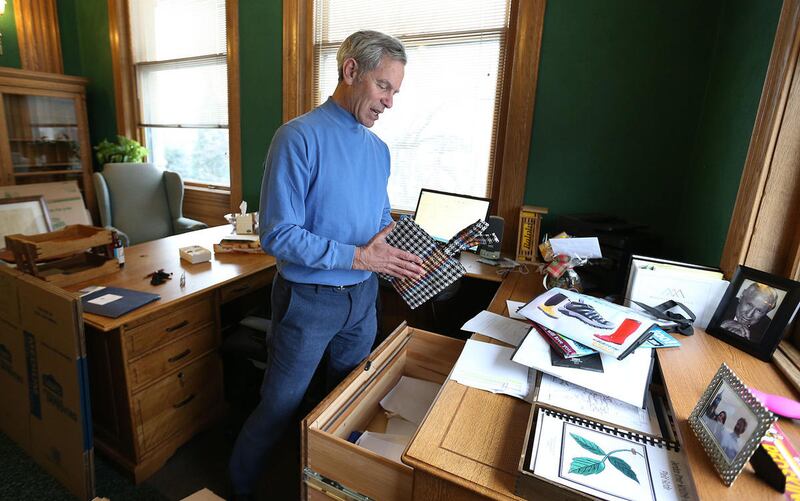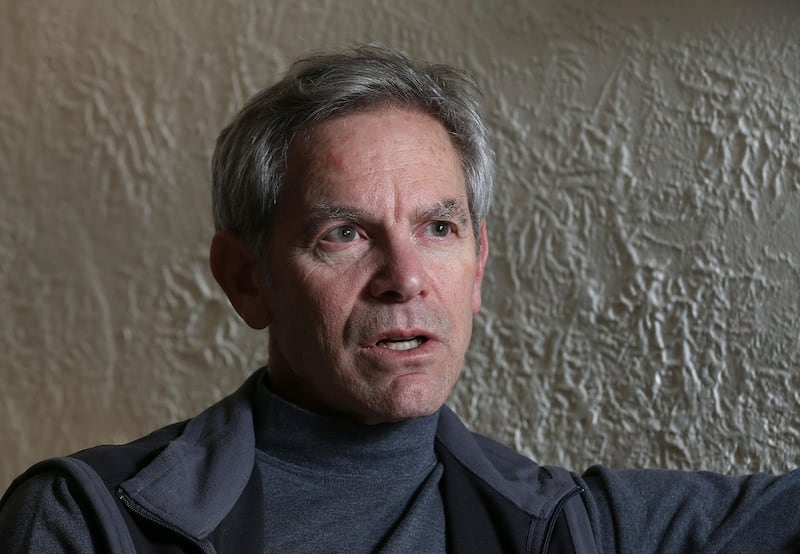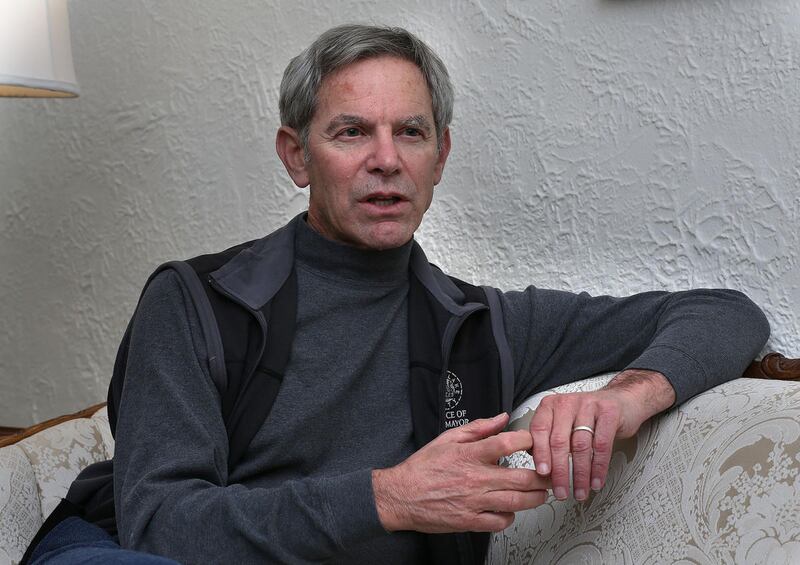SALT LAKE CITY — As 2015 draws to an end, so does Ralph Becker's time as Salt Lake City mayor.
Mayor-elect Jackie Biskupski will take his place Monday after Becker fell less than 1,200 votes short in his bid for a rare third term.
As Becker's final days as mayor ebbed closer, the emerald walls of his office in the Salt Lake City-County Building grew increasingly bare. Earlier this month, he removed the final frame from the wall, a black-and-white photo of him standing with his two sons, Derek and Will.
Surrounded by cardboard boxes filled with old documents, awards and mementoes, Becker said he leaves office feeling fulfilled and proud.
"We have stayed true to what I committed to do when I came into office," he said. "I've certainly done my part."
Over the past eight years, Becker, now 63, led Utah's capital city through the thralls of the Great Recession to nationally renowned economic prosperity, while also advancing sustainability and cultural vibrancy.
"When I first came into office, Salt Lake City was known for probably two things: We were the home of The Church of Jesus Christ and Latter-day Saints, and that we hosted the Olympics," he said.
"Today we are nationally renowned around the rest of the country and even in some respects around the world, known for prosperity, sustainability practices, transportation, and for having a downtown that is a fun place to be."
Achievements
When he was first elected as mayor in 2007, Becker appealed to voters as a planner, a man with a "blueprint" for the city. He took office with an ambitious agenda on issues including sustainability, social justice, and neighborhood and downtown vitality.
Tim Chambless, a University of Utah political science professor affiliated with the Hinckley Institute of Politics, said Becker lived up to his ambitious agenda, and he was able to do so with a lean budget during tough economic times.
"Salt Lake City is a better city now than it was in 2007," Chambless said. "He has a lot to be proud of."
Some of Becker's most notable achievements were also his most controversial, such as building the state's first protected bike lanes and the new, 2,500-seat Eccles Theater on Main Street.
Becker said the challenging times were also the most rewarding, thinking back on the first big controversy of his time in office: deciding where to put the new public safety building.
"A lot of the best things we do in our lives, they don't happen easily," Becker said. "Whether it's taking a horseback trip that challenges you beyond ever expected, or taking a hike that I know is going to be challenging, or going down a river that I know is testing my limits, or whether it's something in my work that I've been convinced over time is really worthwhile."
Known as an outdoor enthusiast and environmental advocate, Becker made a distinct mark on Salt Lake City's sustainability practices, an accomplishment that Chambless said will set Becker apart from other mayors.
Under Becker's administration, the city doubled its bike lanes, performed energy audits, converted its fleet to clean-fuel vehicles, adopted anti-idling ordinances, launched a citywide curbside glass recycling program, and converted city streetlights to energy-efficient LED lighting.
Becker spearheaded the effort to build the nation's first net zero public safety building, a goal also set for the ongoing terminal redevelopment project at Salt Lake City International Airport.
He also launched the Mountain, a public lands project that more than 200 stakeholders — from government, environmental watchdogs, ski resorts and conservation groups — agreed on in July as a framework to both protect the Wasatch Mountains and ensure the region's long-term economic viability.
Becker said he's proud of his role in the Mountain Accord, though he wasn't able to single out a specific moment in office as his greatest accomplishment.
"When I think about this job from the beginning, it's not a single area. It's the elements that make Salt Lake City a unique and great place," he said. "It's how we as a community both take advantage and address the incredible qualities and assets that we have today, whether it's protecting the mountains for the future or providing future opportunity in downtown."
Chambless credited Becker with putting Salt Lake City on a path to become the "epicenter of business for the entire state" by revitalizing Sugar House, Regent Street, and Station Center, a mixed-use urban neighborhood west of the historic Rio Grande Depot. He also advanced transportation initiatives by building the Sugar House streetcar decades ahead of the original schedule and funding the airport TRAX line.
Additionally, Becker's administration built a reputation for its emphasis on human rights, becoming the first municipality in Utah to pass an LGBT nondiscrimination ordinance. He also led an effort to create the state's first mutual commitment registry to recognize and extend benefits to domestic partners — something Becker said he pushed for, despite being advised against it.
"When we started, there were people who said it was too far-reaching, it would never get accepted by the City Council, and then if it did, it would only be overturned by the Legislature," Becker said. "But we did it. The City Council adopted it unanimously. … At first we withstood attacks, but over time, as I had hoped would be the case, the public became informed and the broader majority of the public's views changed."
Salt Lake County Mayor Ben McAdams, who has been a close friend to Becker ever since he interned at the Utah Legislature when Becker served in the state House of Representatives, attributed Becker's success in advancing LGBT issues to his ability to bring the community together.
"The dialogue had been focused on what divides us as a city, and (Becker) was able to turn it into a dialogue about what we have in common," McAdams said. "He wasn't afraid of doing what he believed in. Even if there was controversy, he was a great listener and would bring people around the table."
Becker's ambitions also led him to national and international leadership roles. In 2014, he was elected president of the National League of Cities, a role he will keep until he's no longer mayor. This month, Becker also joined world leaders at the United Nations' Climate Change Conference in Paris.
"He's not only a policy wonk," McAdams said. "On a personal level, (Becker) is a very caring and compassionate person. He really cares about Salt Lake City and the residents. He was in it for the right reasons: to serve our community and make our city a better place to live."
No third term
Becker's 2011 campaign was very different from the 2015 mayoral race. He captured nearly 75 percent of the vote to defeat 2011 challenger J. Allen Kimball. He lost to Biskupski by about 3 percent.
Becker acknowledged 2015 was a challenging year for him personally and professionally, though he said he doesn't have any regrets about how he campaigned.
Becker said he felt he was fighting an uphill battle, since winning a third term is a challenging feat for any mayor. Ted Wilson, first elected in 1975, was the last mayor to win three consecutive terms in Salt Lake City.
Chambless said a combination of factors likely led to Becker's two-term dead end.
While the forced resignation of popular Salt Lake Police Chief Chris Burbank was one of the most distinct actions during the campaign season that reaped negative public reaction, Chambless said Becker's decline in voter approval could be simply because he was running against a strong opponent whose message resonated more with the city's diverse community.
"The demographics of the city have changed, and he was opposed by an opponent that could inspire and motivate a number of voting blocks," Chambless said. "He did not reassure or inspire his voters to come out in the same numbers that Biskupski was able to. And (Biskupski) appealed to minorities who felt ignored or underappreciated."
Becker's "aggressive" agenda, Chambless said, also may have caused voters to shy away.
"Along the way, he picked up enemies for things he believed in," Chambless said. "The longer you're in office, you're going to get folks who disagree with you. … But he was a good mayor. The city is better off to have had him for two terms."
McAdams said he will miss his partnership with Becker but will have "no problem" working with Biskupski.
"Our close level of collaboration really developed because he and I had known each other for so many years," the Salt Lake County mayor said. "He taught me to always be respectful of other people. He's always positive, even in the toughest moments of negotiation. … That partnership will be missed, but without a doubt our friendship will continue."
Knowing his time as mayor will soon come to an end, Becker said he will miss serving Salt Lake City and its residents.
"Obviously I wanted to serve another four years," he said. "But I feel I've been incredibly fortunate to have had a job that has allowed me to participate in this city and make a difference."
Looking ahead
When official election results revealed he would not be returning in 2016, Becker's talked solemnly to reporters about his defeat, speaking frankly about how he had no idea where his career would lead him next.
In a recent interview with the Deseret News at his home in The Avenues, Becker spoke with an air of calm optimism. There's a silver lining to leaving office: His opportunities are wide open.
"I don't know what I will do next, but I'm OK with that," he said.
For the month after the January inauguration, Becker said he plans to travel with his wife, Kate Kopeschke, to hike along the Colorado Plateau and in Zion National Park, as well as ski in the San Juan Mountains.
"This year I've been working 80-plus hour weeks, and until Thanksgiving, I had taken only one weekend off the whole year," he said. "To me, that is unconscionable for my own personal sanity and health, not to mention anyone who has to live with me."
He glanced at Kopeschke, who laughed. She joked about how he was the "sweetest grumpy guy" she's ever met.
"He's a guy if you don't get him out in nature, he goes a little bananas," Kopeschke said. "He needs that."
McAdams, however, said he hopes Becker will continue working on Mountain Accord as a private citizen. When asked if he would continue that work, Becker said he doesn't know what role he would play but he would "certainly like to try."
Becker said he could also see himself staying involved in environmental or sustainability efforts.
"I want to continue to be able to work on things that I care about, with people who I care about," he said. "I want to find things to do that I feel rewarded by. Those things are out there. I don't know what it will be exactly, but they're out there."
Kopeschke said she's "so proud" of her husband, and she knows he will face no shortage of opportunities in the future.
"I think what really makes his socks go up and down is climate change, working with cities and helping them try to understand how to move the bar," she said. "I have a feeling he's going to have a lot of options. He's just going to have to decide."
As a final message to Salt Lake City residents, Becker expressed his appreciation for the opportunity to serve as mayor for eight years.
"Thank you for putting your confidence and trust in me," he said. "I hope I served the city well."
Email: kmckellar@deseretnews.com
Twitter: KatieMcKellar1

